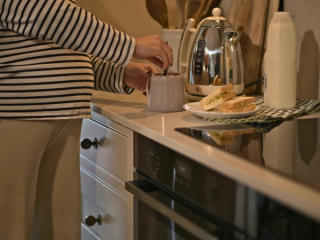
- Home
- Advice And Support
- Pregnancy
- Pregnancy Symptoms & Issues
- Morning Sickness
Morning Sickness: Understanding and Managing Pregnancy Nausea
Discover effective tips for understanding and managing morning sickness during pregnancy. Learn about causes, remedies, and how to find relief from nausea and vomiting.
Morning sickness is a common (and unwanted) symptom experienced by many during pregnancy. It is typically characterised by nausea and vomiting at any time of the day, not just the morning! This article provides a comprehensive overview of morning sickness, including its causes, symptoms, duration, and management strategies.
What is morning sickness?
Morning sickness refers to the nausea and vomiting that many women experience during pregnancy. It usually begins during the first trimester and can vary in intensity. For some, it may be a mild inconvenience, while for others, it can significantly impact daily activities. Morning sickness typically starts around the sixth week of pregnancy, but it can begin as early as the fourth week, particularly if you are pregnant with twins or triplets. Some women may even notice symptoms before they realise they are pregnant.
What causes morning sickness?
Researchers are unsure exact cause of morning sickness, but it is believed to be related to the hormonal changes (https://www.hipp.co.uk/pregnancy-baby-toddler-advice/pregnancy-labour-birth/pregnancy-guidebook/looking-after-you-your-baby/staying-healthy-during-pregnancy/) that occur during pregnancy including HCG, Oestrogen and progesterone. The higher these hormone levels, the more likely it is for morning sickness to occur.
What are the symptoms of morning sickness?
Morning sickness symptoms can vary widely among women but generally include:
- Nausea
- Vomiting
- Loss of appetite
- Fatigue
- Sensitivity to certain smells or foods
How long does morning sickness last?
For most women, morning sickness usually lasts until around the end of the first trimester. However, some may continue to experience symptoms into the second trimester, and a few may have symptoms throughout their pregnancy.
How to cope with morning sickness?
Coping with morning sickness is an individual experience, however there are several strategies that have proven useful to many people who have experienced it:
- Eat small, frequent meals - Keeping your stomach from being empty can help reduce nausea.
- Stay hydrated - Drink plenty of fluids, especially water, ginger tea, or clear broths.
- Avoid triggers - Identify and avoid foods or smells that worsen your nausea. Fatty and spicy foods are a common trigger.
- Rest - Ensure you get plenty of rest, as fatigue can exacerbate nausea.
- Ginger - Consuming ginger in various forms, such as ginger ale, tea, or ginger snaps, can help soothe your stomach.
- Acupressure - Wristbands that apply pressure to specific points on your wrist may help alleviate nausea.
- Eating first thing – Having a small dry snack available next to your bed when you first wake up might help curb the symptoms
- Vitamin B6 supplements - These can help reduce nausea for some women. Consult your doctor or midwife before taking any supplements.
Is there a medical treatment for morning sickness?
If nausea is severe, there are medicines that can be prescribed to help. Speak to your doctor if this affects you at all.
Hyperemesis gravidarum
If your sickness is so severe that you are losing weight, unable to work, and/or require hospital treatment, you may be suffering from hyperemesis gravidarum. This is a serious condition affecting around 1-3% of all pregnancies, sometimes for the first 16-18 weeks and sometimes for the duration of the pregnancy.
This condition requires medical support, so don’t suffer in silence if your nausea and vomiting is severe and does not improve after trying the above lifestyle changes. Talk to your healthcare professional. They will help you work out a treatment plan that ensures you don’t end up dehydrated and malnourished, a risk for both you and your baby.
When should you call your health professional about morning sickness?
Contact your healthcare provider if you experience:
- Severe nausea or vomiting that prevents you from keeping any food or fluids down
- Signs of dehydration, such as dark urine, dizziness, or infrequent urination
- Weight loss
- Vomiting blood
In severe cases, if you are vomiting more than 5 times a day or are unable to keep food down, you may have hyperemesis gravidarum, a severe form of pregnancy sickness. This is not the same as morning sickness which is primarily nausea. Hyperemesis gravidarum is debilitating and often requires hospital intervention.
Morning sickness can be challenging, but it is generally manageable with the right strategies and support. Don't hesitate to reach out to your midwife or healthcare provider with any concerns or questions. They can provide personalised advice and reassurance, helping you get through the tough symptoms.
Frequently asked questions about morning sickness
Yes, it is not unheard of to experience morning sickness as early as 4 weeks into your pregnancy.
Some women may start feeling nauseous before a missed period or a positive pregnancy test, although this is less common.
Yes, it is normal for some women to experience nausea and vomiting throughout the day, not just in the morning.
The absence of morning sickness at 6 weeks is normal and varies from woman to woman. Some may never experience morning sickness, lucky them!
Nausea typically peaks around the 9th to 12th weeks of pregnancy.







